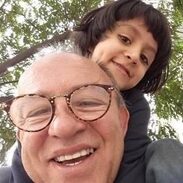 I ask for acceptance to earn the PsyD Degree at the XXXX Institute so that I might add the final and most important professional hat to my repertoire of historically interconnected or culminating roles. First, I gave my all for my country as a soldier; then I became an Episcopal Priest. Since June of 2014, I have served as the Director of Admissions at the XXXX School Prior to this position, I served for two years as a parish priest at XXXX Episcopal Church in XXXX. The cause to which I have decided to vote the balance and hopefully by far most significant part of my professional life is that of helping our veterans to heal. My comrades have been thrust into questionable moral situations for a very long time, forced to engage in many morally questionable activities, and with all too great a frequency fall into moral decay, as a result of stress, violence, and in some cases their own moral failure. I see the Wright Institute as the best fit for my interests, an academic community in which to find support and ideas to empower and inspire me to write a doctoral dissertation on the subject of Moral Injury and how it is related to PTSD.
I ask for acceptance to earn the PsyD Degree at the XXXX Institute so that I might add the final and most important professional hat to my repertoire of historically interconnected or culminating roles. First, I gave my all for my country as a soldier; then I became an Episcopal Priest. Since June of 2014, I have served as the Director of Admissions at the XXXX School Prior to this position, I served for two years as a parish priest at XXXX Episcopal Church in XXXX. The cause to which I have decided to vote the balance and hopefully by far most significant part of my professional life is that of helping our veterans to heal. My comrades have been thrust into questionable moral situations for a very long time, forced to engage in many morally questionable activities, and with all too great a frequency fall into moral decay, as a result of stress, violence, and in some cases their own moral failure. I see the Wright Institute as the best fit for my interests, an academic community in which to find support and ideas to empower and inspire me to write a doctoral dissertation on the subject of Moral Injury and how it is related to PTSD.
I look forward to many decades to come fully immersed in an exploration of the ways that Moral Injury has, in the words of Rut Gubkin: "biological, emotional, neurological and spiritual and/or existential dimensions." As a priest of ecumenical formation, I believe that I have education/training/experience that will prove to be of great value in the development of models for healing that incorporate spirituality from a diverse body of religious backgrounds with a central focus on spirituality itself, rather than spirituality as it exists within any given religious tradition. I am especially interested in first studying, perhaps even helping to perfect or contribute to the development of Moral Injury Event Scales (MIES). I am pleased that there is already an extensive body of literature with which I have to work as a foundation, helpful data regarding moral injury resulting from transgressions by others, transgressions by self, and transgression by betrayal, resulting in stress, PTSD, feelings of hopelessness, pessimism, anger and rage.
I look forward to connecting some of the dots from my own experience as a soldier, with Moral Injury Theory which suggests, for example, that those who suffer Moral Injury as a result of the transgressions of others rather than their own are especially susceptible to PTSD. I saw this to be glaringly true of the poor fellows who I interacted with in the mortuary affairs unit overseas. They are the ones who process the bodies of those killed in action. They processed both Americans and the local Iraqi population who were killed in action (KIA). It's a terrible thing to see a mother and father lying on a table next to their children, the entire family KIA. It is even worse to see this several times a day, almost every day, for long periods of time. As if this were not yet tragic enough, these soldiers were well aware that many if not most of these casualties of war that come from air strikes that are not reported on the news and sometimes not reported at all. The transgressions of others often occur by people making simple mistakes with deadly consequences; these transgressions are also the most heavily correlated with PTSD.
Transgressions of self, on the other hand, have been shown to be more strongly associated with hopelessness, pessimism, and anger. One young marine from my unit was the gunner on top of a vehicle and the driver fell asleep and lost control, flipped the vehicle, and the young marine was crushed and mangled beyond recognition. Despite the fact that what happened was an accident, the driver of this vehicle is likely to experience more trauma than would have been the case if he had fallen asleep in civilian traffic and taken a life—due to the sheer chaos and ambiguity of combat. Adrenaline, fear, and a desire for revenge can be most lethal combinations resulting in soldiers all too frequently transgressing their own sense of morality in the heat of battle, making split-second decisions that will haunt them for a lifetime, leaving the with invisible scars that are sometimes not easy to detect.
I am especially concerned with the variety of ways in which Transgressionsof Self in warfare can have deadly consequences. One suicidal young marine that I dealt with in my office stands out in my mind. He had been standing guard on a dirt road in Fallujah when a car was approaching his checkpoint. The car was not slowing down so he aimed his rifle at the driver and pulled the trigger. The bullet struck the driver in the head and the car came to a slow stop. There was a 5 year old boy in the front seat covered in his father’s blood. The young boy was crying uncontrollably as the driver was still grasping for his last few breathes. Radio communication was not working properly and the marine who pulled the trigger spent 2 hours with the young boy and his now-dead father before backup arrived. This had happened 3 months prior to our conversation. I glanced down at his boots and noticed that the bloodstains were still there.
Finally, I seek to excel in Moral Injury Theory and PTSD treatment in my research concerning “Betrayal.” The damage that occurs from the perception of being morally betrayed is especially evident among Iraq veterans who feel strongly that they were betrayed by their government because they were required to fight an unjust war, and that the blood that has been spilled in Iraq has been spilled in vain. The struggle to recover for these veterans who suffer from a sense of Betrayal is compounded by the fact that evidence has continued to emerge that they were indeed sent to war on the basis of false intelligence (no weapons of mass destruction). Many joined the military because they felt that they were serving a greater purpose after the country was attacked on 9-11. Now they have to deal with the fact that Saddam/Iraq had nothing to do with 9-11. They are left with the unsettling question about the atrocities of war they participated in and what was it all for?
My central objective in life has always been to serve others, first in the military, followed by the ministry; these days I mostly serve the needs of prospective graduate students. My experiences as a priest in the Episcopal Church have given me a platform for making connections with groups on every level, from the Bay Area to internationally. I have valuable connections to important people that will help me to excel, with the leaders of Episcopal Relief and Development (ERD) for example, an international relief and development agency that is currently operating in over 40 countries. This is also why I feel strongly that I am an especially good fit with The XXXX Institute since your motto is "Educating Clinicians to Society.” 10 years from now I hope to be serving as a psychologist with ERD, working on an interdisciplinary team of medical doctors, nurses and social workers.
My ideal roles and responsibilities include that of educator as well as clinician providing psychological services in the various parts around the globe served by ERD to populations that have been displaced by war, within refugee camps, and areas affected by natural disaster. As an educator I want to be a valuable resource to the leadership of ERD concerning the needs that exist for psychological services in crises areas around the globe, in addition to attending to the psychological needs of the staff and volunteers of ERD. Over the course of the last 2 years, I have come to increasingly recognize a calling to pursue a new career direction in clinical psychology, meeting twice a month with a therapist about this career change. I feel confident that I am making the right decision and have the support of my wife as well, an attorney with an established practice here in XXXX, and most certainly one of the most valuable of my social connections and human resources.
I appreciate XXXX’s commitment to diversity, social justice and equality and how you require students to be in a field placement getting real world experience each year of the program, including the first year. I want to gain as much experience as possible and I believe that getting real world experience while in the midst of academic study is an effective strategy for creative learning. The therapist whom I have worked with for over a year about my career change is a Psychiatrist and Marriage and Family Therapist and he suggested the Wright Institute. I very much admire the research endeavors of your faculty, most especially the work of Dr. XXXX and his research into anxiety disorder. A former Lutheran minister, I particularly look forward to comparing notes with and learning from Dr. XXXX.
In addition to Moral Injury among veterans, I am also looking forward to an in-depth study of the extent to which Moral Injury occurs in non-military, even non-violent situations. I want to study the history and range of both PTSD and Moral Injury in an exhaustive fashion, especially in light of ethical transgressions, attorneys who make poor life/death decisions for their clients, negligent doctors or nurses, financiers that have committed fraud; at least theoretically the possibilities are endless, hence the search for the best way to define or delimit definitions of these terms in psychology that have become increasingly important to our efforts to diagnose and cure, especially our veterans returning from the field. I thank you for considering my application.



